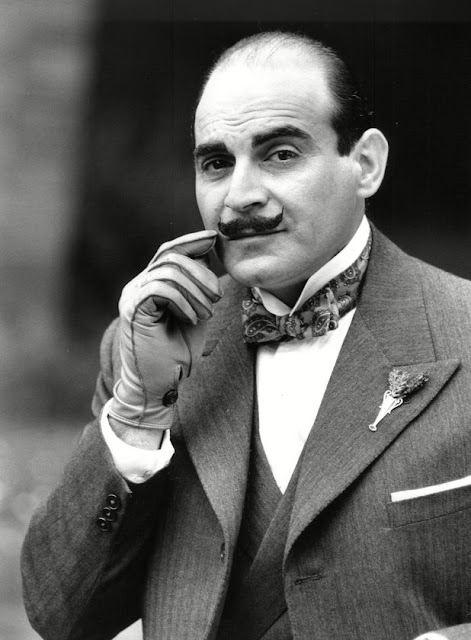Agatha Christie's Poirot: Evolution Of A Detective Icon

Poirot's Creation and Early Years: The "Eggshell" Detective
Hercule Poirot's origins lie in the pages of The Mysterious Affair at Styles, published in 1920. This debut introduced the world to a unique character: a fastidious, self-assured Belgian detective with an undeniable ego and a penchant for order. His meticulously groomed mustache, his theatrical pronouncements, and his unwavering belief in his "little grey cells" instantly established him as a memorable figure. Poirot's early cases, often solved through his methodical approach and keen observation skills, showcased his signature style: a blend of deduction, psychology, and an almost theatrical flair for presentation.
- Physical Appearance and Personality Quirks: Poirot's distinctive appearance – his neat mustache, his precise attire, and his rather imposing presence – was as much a part of his character as his intelligence. His eccentricities, such as his obsession with symmetry and order, added to his charm and mystique.
- Early Investigative Methods: In his early novels, Poirot's methods were largely based on meticulous observation and deduction. He relied heavily on gathering physical evidence and piecing together seemingly insignificant details to unravel complex crimes.
- Relationship with Captain Hastings: The early novels often feature Captain Hastings as Poirot's companion and narrator, providing a counterpoint to Poirot's brilliance and showcasing the detective's unique interaction with others. This dynamic added another layer to Poirot's personality and made him more relatable to readers.
The Maturing Detective: Growth and Refinement of Poirot's Methods
As the series progressed, Poirot's character, like the world around him, matured and evolved. His investigative techniques became more sophisticated, incorporating a deeper understanding of human psychology. While his meticulous nature remained a constant, his approach to solving crimes became more nuanced and insightful. The changing social contexts of the interwar period and World War II influenced both Christie's writing style and the challenges Poirot faced, forcing him to adapt his methods and confront new complexities.
- Evolving Investigative Techniques: Poirot's reliance on instinct and intuition grew alongside his logical deductions. He demonstrated a heightened understanding of human motivations and the subtle psychological cues that could unlock the truth.
- Relationships with Other Recurring Characters: Over the years, Poirot developed complex relationships with other recurring characters, adding depth and intrigue to his investigations. These interactions helped him understand the motivations of suspects and gave his character more layers.
- Consistent Personality: While his methods adapted, Poirot's core personality remained remarkably consistent, showcasing unwavering self-belief and the satisfying resolution of complex crimes, a captivating element for readers.
The Impact of World Events on Poirot's Stories
World War II profoundly impacted Agatha Christie's writing and the context of Poirot's adventures. Novels written during this period reflected the anxieties and uncertainties of the time, adding a palpable sense of tension and unpredictability to the plots. Poirot, ever adaptable, faced new challenges in a world grappling with war and its aftermath.
- Wartime Novels: Several novels directly reflected the backdrop of the war, exploring its impact on individuals and society, themes Christie masterfully wove into Poirot's investigations.
- War's Influence on Poirot: The war years saw Poirot confront new complexities, working within a changed social and political landscape, and his experiences are reflected in his interactions with the people he met and the challenges he faced.
Poirot's Legacy: Enduring Influence on Detective Fiction
Hercule Poirot's influence on detective fiction is undeniable. His meticulously crafted personality, his distinctive investigative methods, and his enduring popularity have inspired countless subsequent detectives and shaped the genre itself. From countless books to popular television adaptations, his legacy continues to thrive in modern media.
- Detectives Inspired by Poirot: Many renowned detectives in modern crime fiction owe a debt to Poirot's influence, inheriting his meticulous nature, intellectual prowess, and eccentric personality traits.
- Modern Adaptations: The enduring appeal of Poirot has led to numerous successful film and television adaptations, showcasing his enduring character and introducing him to new generations.
- Enduring Appeal: Poirot's enduring appeal stems from a compelling blend of brilliance, eccentricity, and a deep understanding of human nature, a combination that resonates with readers and viewers even today.
Conclusion
Agatha Christie's Hercule Poirot stands as a testament to the enduring power of meticulously crafted characters. His evolution throughout Christie's novels – from a somewhat stiff and formal detective in his early cases to a more nuanced and psychologically astute investigator in his later years – reflects both the changing times and the growth of Christie's own writing style. His lasting impact on detective fiction and the enduring popularity of his modern adaptations highlight the enduring strength of this iconic detective. Delve deeper into the world of Agatha Christie's Poirot – explore the fascinating evolution of this detective icon and uncover the mysteries surrounding Hercule Poirot's enduring legacy. Start with The Mysterious Affair at Styles or explore one of the many acclaimed television adaptations; either way, you're in for a captivating journey.

 Huuhkajat Avauskokoonpanoon Merkittaeviae Muutoksia Kaellman Ulkopuolella
Huuhkajat Avauskokoonpanoon Merkittaeviae Muutoksia Kaellman Ulkopuolella
 Thousands Owe Hmrc Unclaimed Savings And Refunds
Thousands Owe Hmrc Unclaimed Savings And Refunds
 Adressage Du District Autonome D Abidjan Etat D Avancement
Adressage Du District Autonome D Abidjan Etat D Avancement
 The World Of Agatha Christies Poirot Characters Settings And Adaptations
The World Of Agatha Christies Poirot Characters Settings And Adaptations
 Abidjan Accueille L Ivoire Tech Forum 2025 Transformation Numerique Et Innovation
Abidjan Accueille L Ivoire Tech Forum 2025 Transformation Numerique Et Innovation
